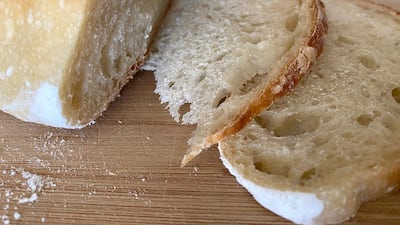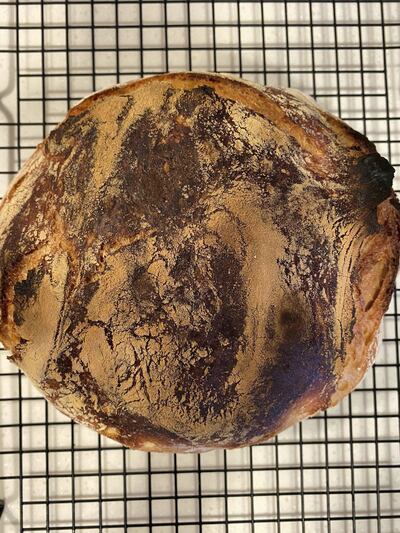I pull a perfectly crusty boule from my oven. The kitchen smells so good that my children, who are 15 and 19, shuffle out of their rooms, eyes bleary from online learning and video chatting with college friends scattered around the world. The three of us look down at the Instagram-ready loaf. “My god, mum, look what you did. That’s amazing,” says the 19-year-old. He hasn’t been this impressed with me for at least a decade. The 15-year-old bypasses compliments and cuts to the chase: “When can we eat it and do we have good butter?”
We do have good butter. It melts into the warm slices like balm. And, for a few moments, standing there with my children, chewing fresh bread with butter, my mind is quiet. The pandemic-induced anxiety that has been a constant thrumming accompaniment to my every waking minute subsides. I wonder briefly if I could spend the rest of our social-distancing time simply making and eating bread. The kilos will accumulate, true, and I would waddle out of quarantine with a boule-shaped body, but it might not be a bad trade-off, all things considered.
By nature, I am not a baker. I am not precise and I don’t like chemistry. I’m a stove-top person: add a bit of this, a dash of that, stir it around, and if it ends up not tasting that great on its own, wrap it in a tortilla and add cheese.
But now, in the desperate uncertainty of the coronavirus pandemic, I don’t want a sprinkle of this or a smattering of that. At a time when no one knows what’s going to happen, what could be more comforting than the certainty of bread? Perhaps that’s the reason for people panic-buying flour: how better to cope with the reality of being vulnerable and overwhelmed by circumstance than by measuring out cups of flour, teaspoons of salt and a sprinkling of the magic that is yeast? It’s precise. Calibrated. An act of domestic faith.
The boule I made comes from Jim Lahey’s (owner of Sullivan Street Bakery) famous “no-knead” recipe, which in some ways is the most magical of recipes because the bread just happens, with almost no human intervention. It emerges as bread, that is to say, even if you stay socially distant from it. And yet, for all of the no-knead deliciousness of Sullivan’s recipe, for my next loaf, I’m going to have to get more involved.
I think I need to dig my hands into the dough, a need explained by Sethe, the heroine of Toni Morrison's Beloved, who ekes out a living as a baker. There's nothing better than kneading bread, she thinks to herself, as a way to "start the day's serious work of beating back the past".
My problems can’t compare to Sethe’s but, like her, I’ve got some things to beat back: worries about my mother, whose immune system has been ravaged by a lifetime of rheumatoid arthritis, and about my 92-year-old father-in-law, now shut-in and alone in his New York apartment. I fret about my students, past and present, many of whom are living in Covid-19 hot spots. If my hands were deep in dough, soft as flesh, I could try to knead away my inchoate grief about a world reeling with loss.
It has a shape, the boule I made, unlike my anxiety, which is a free-floating miasma that settles over me in the middle of the night like a reverse oxygen mask. It sucks the air out of me, makes it so hard for me to breathe that I stumble to the bathroom in the night and take my temperature. “If I don’t have a fever, I can’t be sick,” I tell myself again and again, mantra-like, until I can fall back to sleep.
I mean, yes, I know, it’s just bread. But it’s also a miracle: a blobby goo that metastasises into something edible, beautiful, even nutritious (if you can forego the butter, which I cannot). It’s as if yeast is the anti-virus: it creates, rather than destroys.
Deborah L Williams is a literature professor at NYU Abu Dhabi


